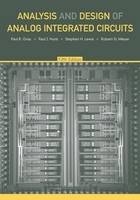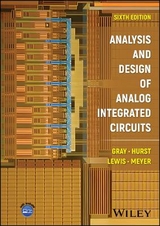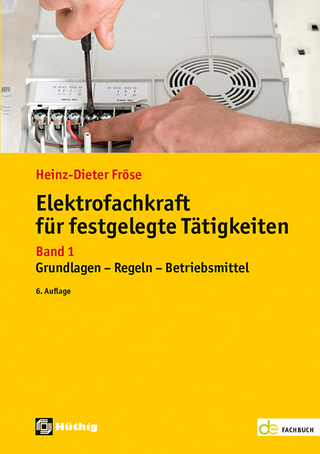
Analysis and Design of Analog Integrated Circuits
Wiley-Blackwell (Verlag)
978-0-470-24599-6 (ISBN)
- Titel erscheint in neuer Auflage
- Artikel merken
This is the only comprehensive book in the market for engineers that covers CMOS, bipolar technologies, and biCMOS integrated circuits. The fifth edition retains its completeness, updates the coverage of bipolar technologies, and enhances the discussion of biCMOS. It provides a more unified treatment of digital and analog circuit design while strengthening the coverage of CMOS. The chapter on non-linear analog circuits has been removed and chapter 11 has been updated to include an operational amplifier example. With its streamlined and up-to-date coverage, more engineers will turn to this resource to explore key concepts in the field.
Paul R. Gray received the BS, MS, and PhD degrees from the University of Arizona. He joined the University of California, Berkeley in 1971 with the Department of Electrical Engineering and Computer Sciences.Gray's research interests include bipolar and MOS circuit design, electro thermal interactions in integrated circuits, device modeling, telecommunications circuits, and analog-digital interfaces on analog integrated circuits. He is a member of numerous engineering and computer science organizations and is highly regarded in the field. Gray also holds several prizes, including the IEEE R.W.G. Baker Prize, IEEE Morris K Liebman award, IEEE Solid-State Circuits award, and many more.
CHAPTER 1 Models for Integrated-Circuit Active Devices 1
1.1 Introduction 1
1.2 Depletion Region of a pn Junction 1
1.3 Large-Signal Behavior of Bipolar Transistors 8
1.4 Small-Signal Models of Bipolar Transistors 25
1.5 Large-Signal Behavior of Metal-Oxide-Semiconductor Field-Effect Transistors 38
1.6 Small-Signal Models of MOS Transistors 49
1.7 Short-Channel Effects in MOS Transistors 59
1.8 Weak Inversion in MOS Transistors 65
1.9 Substrate Current Flow in MOS Transistors 71
A.1.1 Summary of Active-Device Parameters 73
CHAPTER 2 Bipolar, MOS, and BiCMOS Integrated-Circuit Technology 78
2.1 Introduction 78
2.2 Basic Processes in Integrated-Circuit Fabrication 79
2.3 High-Voltage Bipolar Integrated-Circuit Fabrication 88
2.4 Advanced Bipolar Integrated-Circuit Fabrication 92
2.5 Active Devices in Bipolar Analog Integrated Circuits 95
2.6 Passive Components in Bipolar Integrated Circuits 115
2.7 Modifications to the Basic Bipolar Process 123
2.8 MOS Integrated-Circuit Fabrication 127
2.9 Active Devices in MOS Integrated Circuits 131
2.10 Passive Components in MOS Technology 146
2.11 BiCMOS Technology 152
2.12 Heterojunction Bipolar Transistors 153
2.13 Interconnect Delay 156
2.14 Economics of Integrated-Circuit Fabrication 156
A.2.1 SPICE Model-Parameter Files 162
CHAPTER 3 Single-Transistor and Multiple-Transistor Amplifiers 169
3.1 Device Model Selection for Approximate Analysis of Analog Circuits 170
3.2 Two-Port Modeling of Amplifiers 171
3.3 Basic Single-Transistor Amplifier Stages 173
3.4 Multiple-Transistor Amplifier Stages 201
3.5 Differential Pairs 214
A.3.1 Elementary Statistics and the Gaussian Distribution 244
CHAPTER 4 Current Mirrors, Active Loads, and References 251
4.1 Introduction 251
4.2 Current Mirrors 251
4.3 Active Loads 276
4.4 Voltage and Current References 297
A.4.1 Matching Considerations in Current Mirrors 325
A.4.1.1 Bipolar 325
A.4.1.2 MOS 328
A.4.2 Input Offset Voltage of Differential Pair with Active Load 330
A.4.2.1 Bipolar 330
A.4.2.2 MOS 332
CHAPTER 5 Output Stages 341
5.1 Introduction 341
5.2 The Emitter Follower as an Output Stage 341
5.3 The Source Follower as an Output Stage 353
5.4 Class B Push–Pull Output Stage 359
5.5 CMOS Class AB Output Stages 379
CHAPTER 6 Operational Amplifiers with Single-Ended Outputs 400
6.1 Applications of Operational Amplifiers 401
6.2 Deviations from Ideality in Real Operational Amplifiers 415
6.3 Basic Two-Stage MOS Operational Amplifiers 421
6.4 Two-Stage MOS Operational Amplifiers with Cascodes 438
6.5 MOS Telescopic-Cascode Operational Amplifiers 439
6.6 MOS Folded-Cascode Operational Amplifiers 442
6.7 MOS Active-Cascode Operational Amplifiers 446
6.8 Bipolar Operational Amplifiers 448
CHAPTER 7 Frequency Response of Integrated Circuits 490
7.1 Introduction 490
7.2 Single-Stage Amplifiers 490
7.3 Multistage Amplifier Frequency Response 518
7.4 Analysis of the Frequency Response of the NE5234 Op Amp 539
7.5 Relation Between Frequency Response and Time Response 542
CHAPTER 8 Feedback 553
8.1 Ideal Feedback Equation 553
8.2 Gain Sensitivity 555
8.3 Effect of Negative Feedback on Distortion 555
8.4 Feedback Configurations 557
8.5 Practical Configurations and the Effect of Loading 563
8.6 Single-Stage Feedback 587
8.7 The Voltage Regulator as a Feedback Circuit 593
8.8 Feedback Circuit Analysis Using Return Ratio 599
8.9 Modeling Input and Output Ports in Feedback Circuits 613
CHAPTER 9 Frequency Response and Stability of Feedback Amplifiers 624
9.1 Introduction 624
9.2 Relation Between Gain and Bandwidth in Feedback Amplifiers 624
9.3 Instability and the Nyquist Criterion 626
9.4 Compensation 633
9.5 Root-Locus Techniques 664
9.6 Slew Rate 681
A.9.1 Analysis in Terms of Return-Ratio Parameters 693
A.9.2 Roots of a Quadratic Equation 694
CHAPTER 10 Nonlinear Analog Circuits 704
10.1 Introduction 704
10.2 Analog Multipliers Employing the Bipolar Transistor 704
10.3 Phase-Locked Loops (PLL) 716
10.4 Nonlinear Function Synthesis 731
CHAPTER 11 Noise in Integrated Circuits 736
11.1 Introduction 736
11.2 Sources of Noise 736
11.3 Noise Models of Integrated-Circuit Components 744
11.4 Circuit Noise Calculations 748
11.5 Equivalent Input Noise Generators 756
11.6 Effect of Feedback on Noise Performance 764
11.7 Noise Performance of Other Transistor Configurations 771
11.8 Noise in Operational Amplifiers 776
11.9 Noise Bandwidth 782
11.10 Noise Figure and Noise Temperature 786
CHAPTER 12 Fully Differential Operational Amplifiers 796
12.1 Introduction 796
12.2 Properties of Fully Differential Amplifiers 796
12.3 Small-Signal Models for Balanced Differential Amplifiers 799
12.4 Common-Mode Feedback 804
12.5 CMFB Circuits 811
12.6 Fully Differential Op Amps 823
12.7 Unbalanced Fully Differential Circuits 838
12.8 Bandwidth of the CMFB Loop 844
12.9 Analysis of a CMOS Fully Differential Folded-Cascode Op Amp 845
Index 871
| Erscheint lt. Verlag | 1.4.2009 |
|---|---|
| Zusatzinfo | Drawings: 0 B&W, 0 Color |
| Verlagsort | Hoboken |
| Sprache | englisch |
| Maße | 185 x 257 mm |
| Gewicht | 1474 g |
| Themenwelt | Technik ► Elektrotechnik / Energietechnik |
| ISBN-10 | 0-470-24599-9 / 0470245999 |
| ISBN-13 | 978-0-470-24599-6 / 9780470245996 |
| Zustand | Neuware |
| Haben Sie eine Frage zum Produkt? |
aus dem Bereich



